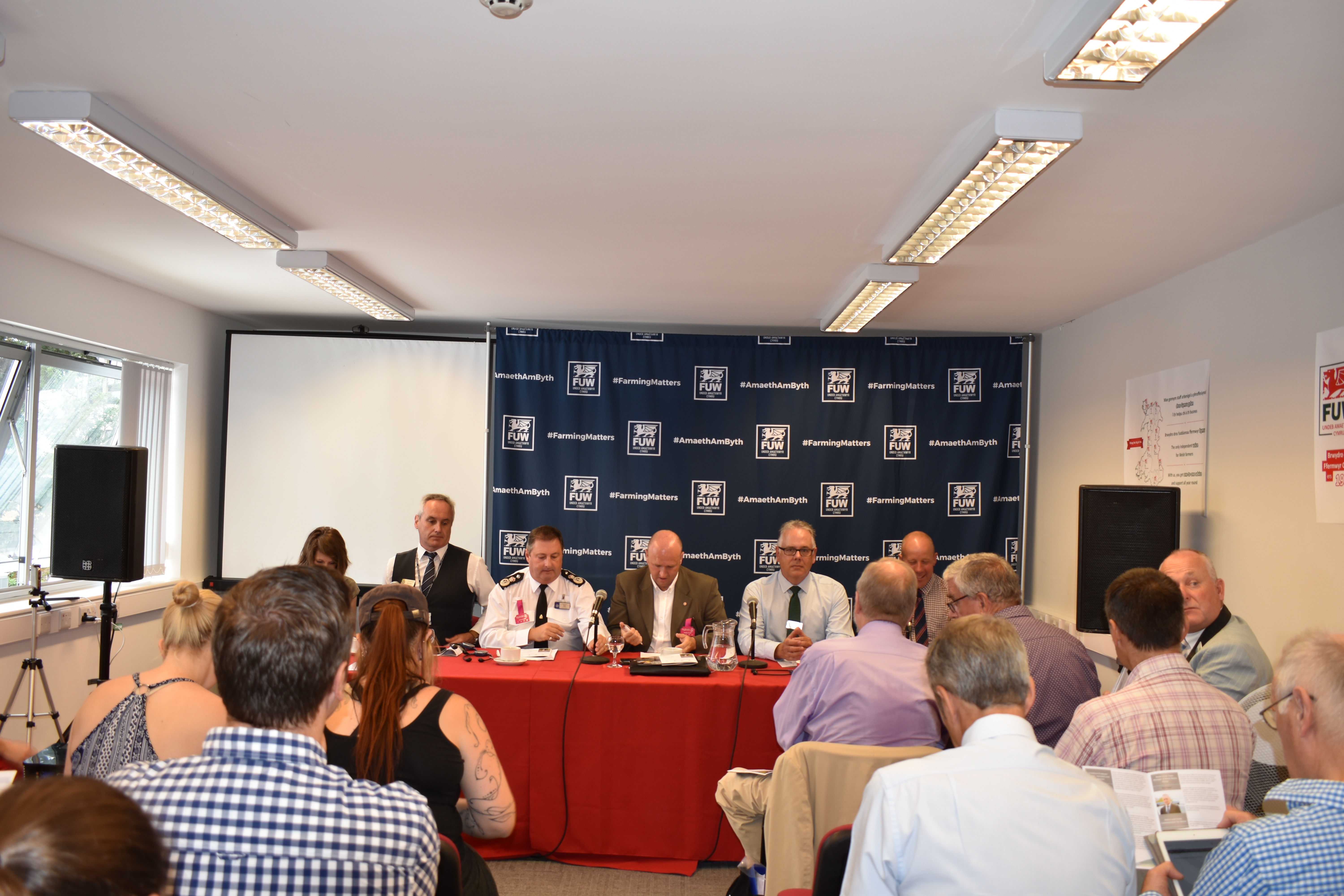
Police and Crime Commissioner for Dyfed-Powys Dafydd Llywelyn helped kick-start proceedings, as he welcomed a panel of experts to discuss matters of rural and wildlife crime with members of the public. The panel consisted of six members from key stakeholders and commentators, including Natural Resources Wales, North Wales Police, Farmers' Union of Wales, Chief Constable Mark Collins of Dyfed-Powys Police, the Wales lead for Wildlife Crime and Rural Affairs, Gwent Police, and the veteran agriculture broadcaster and journalist, Anna Jones.
The Forum coincided with the publishing of the 2018 National Rural Crime Network Survey 2018, which revealed that low expectations, under reporting, perceived poor response and outcomes as well as worry are all contributing factors to an increased fear of crime amongst our rural communities. Furthermore, results shows that around a third of crimes in rural areas go unreported to Police, and is rising. The judgement was unanimous; to address this, agencies must take a proactive approach toward policing rural areas, and that this must be reflected in organisational policy and decision making.
Dafydd Llywelyn, Police and Crime Commissioner for Dyfed-Powys, and Chairperson of the Forum said:
"Today’s Rural Crime Forum is an excellent opportunity to listen to the concerns of the agricultural community, and to gain a true insight into the complexities of rural crime here in Dyfed-Powys and the rest of Wales."
The audience used the opportunity to raise pertinent questions, with the main topics including fly tipping, modern slavery and specifically County Lines, which sees drug gangs exploiting young and vulnerable people in rural areas.
FUW Vice President Ian Rickman said:
"The Forum was a great opportunity to hear what’s been done to tackle rural crime across Wales. It’s an issue that affects our members regularly and the FUW will continue to positively engage with all Police Forces to promote farm security and help tackle this important issue".
Alun Davies AM, Cabinet Secretary for Local Government and Public Services said:
"Although Policing is not devolved, what we can achieve together is far greater than as agencies working in silos. I want to see us sharing more experience and specialism. The eyes and ears of law and order need to be us, and we have a collective responsibility in tackling rural crime".
Joining the panel was journalist Anna Jones, originally from Powys, who has extensive experience of rural affairs in England and Wales. In reference to the Survey’s results, Anna said:
"It is worrying that 69 percent of farmers and agricultural businesses have noted that they have been victims of crime in the last year. We must ask the question whether such a high percentage would be tolerated in any other industry."
In 2017, after consultation with the public and following research undertaken by Aberystwyth University, Dyfed-Powys Police renewed and relaunched its Rural Crime Strategy. This strategic approach echoes developments across other rural areas in Wales, notably North Wales Police and Gwent Police. Chief Constable Mark Collins highlighted some encouraging developments since the launch of the Strategy, including improved partnership working with key-stakeholders such as Natural Resources Wales.
This is reflected with the ongoing partnership work between rural forces in Wales, which provides a platform for shared knowledge that is key to tackling cross-border criminality. Dyfed-Powys Police now has a dedicated team in place to deal with wildlife and rural affairs, trained by Rob Taylor, Team Manager of North Wales Police’s Rural Crime Team.
In closing the Forum, Dafydd Llywelyn said: "There is certainly an appetite for positive change in the way that we are strategically approaching rural crime on an all-Wales level. I want to thank all those who have attended today, and I invite all industry groups and stakeholders to hold us to account over the coming year. It is important that we work together to tackle the issue at hand, and I look forward to constructive dialogue in the coming year and for this to be reflected in our discussions in 12 months’ at the next Rural Crime Forum.


